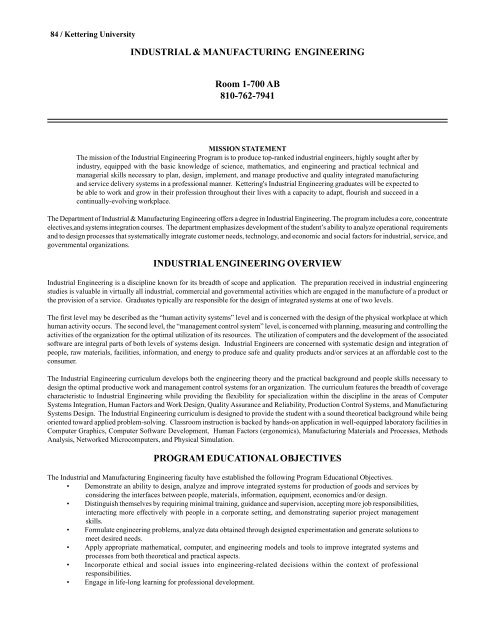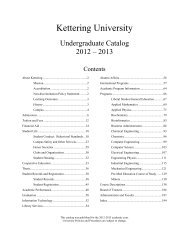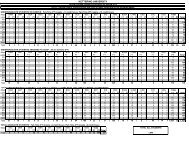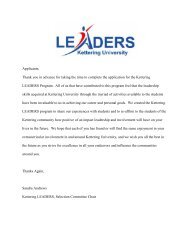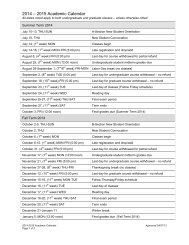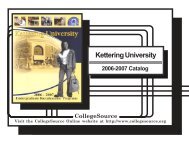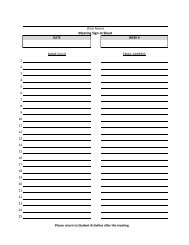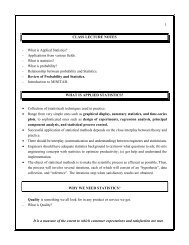2007-2008 Undergraduate Catalog - Kettering University
2007-2008 Undergraduate Catalog - Kettering University
2007-2008 Undergraduate Catalog - Kettering University
You also want an ePaper? Increase the reach of your titles
YUMPU automatically turns print PDFs into web optimized ePapers that Google loves.
84 / <strong>Kettering</strong> <strong>University</strong><br />
INDUSTRIAL & MANUFACTURING ENGINEERING<br />
Room 1-700 AB<br />
810-762-7941<br />
MISSION STATEMENT<br />
The mission of the Industrial Engineering Program is to produce top-ranked industrial engineers, highly sought after by<br />
industry, equipped with the basic knowledge of science, mathematics, and engineering and practical technical and<br />
managerial skills necessary to plan, design, implement, and manage productive and quality integrated manufacturing<br />
and service delivery systems in a professional manner. <strong>Kettering</strong>'s Industrial Engineering graduates will be expected to<br />
be able to work and grow in their profession throughout their lives with a capacity to adapt, flourish and succeed in a<br />
continually-evolving workplace.<br />
The Department of Industrial & Manufacturing Engineering offers a degree in Industrial Engineering. The program includes a core, concentrate<br />
electives,and systems integration courses. The department emphasizes development of the student’s ability to analyze operational requirements<br />
and to design processes that systematically integrate customer needs, technology, and economic and social factors for industrial, service, and<br />
governmental organizations.<br />
INDUSTRIAL ENGINEERING OVERVIEW<br />
Industrial Engineering is a discipline known for its breadth of scope and application. The preparation received in industrial engineering<br />
studies is valuable in virtually all industrial, commercial and governmental activities which are engaged in the manufacture of a product or<br />
the provision of a service. Graduates typically are responsible for the design of integrated systems at one of two levels.<br />
The first level may be described as the “human activity systems” level and is concerned with the design of the physical workplace at which<br />
human activity occurs. The second level, the “management control system” level, is concerned with planning, measuring and controlling the<br />
activities of the organization for the optimal utilization of its resources. The utilization of computers and the development of the associated<br />
software are integral parts of both levels of systems design. Industrial Engineers are concerned with systematic design and integration of<br />
people, raw materials, facilities, information, and energy to produce safe and quality products and/or services at an affordable cost to the<br />
consumer.<br />
The Industrial Engineering curriculum develops both the engineering theory and the practical background and people skills necessary to<br />
design the optimal productive work and management control systems for an organization. The curriculum features the breadth of coverage<br />
characteristic to Industrial Engineering while providing the flexibility for specialization within the discipline in the areas of Computer<br />
Systems Integration, Human Factors and Work Design, Quality Assurance and Reliability, Production Control Systems, and Manufacturing<br />
Systems Design. The Industrial Engineering curriculum is designed to provide the student with a sound theoretical background while being<br />
oriented toward applied problem-solving. Classroom instruction is backed by hands-on application in well-equipped laboratory facilities in<br />
Computer Graphics, Computer Software Development, Human Factors (ergonomics), Manufacturing Materials and Processes, Methods<br />
Analysis, Networked Microcomputers, and Physical Simulation.<br />
PROGRAM EDUCATIONAL OBJECTIVES<br />
The Industrial and Manufacturing Engineering faculty have established the following Program Educational Objectives.<br />
• Demonstrate an ability to design, analyze and improve integrated systems for production of goods and services by<br />
considering the interfaces between people, materials, information, equipment, economics and/or design.<br />
• Distinguish themselves by requiring minimal training, guidance and supervision, accepting more job responsibilities,<br />
interacting more effectively with people in a corporate setting, and demonstrating superior project management<br />
skills.<br />
• Formulate engineering problems, analyze data obtained through designed experimentation and generate solutions to<br />
meet desired needs.<br />
• Apply appropriate mathematical, computer, and engineering models and tools to improve integrated systems and<br />
processes from both theoretical and practical aspects.<br />
• Incorporate ethical and social issues into engineering-related decisions within the context of professional<br />
responsibilities.<br />
• Engage in life-long learning for professional development.


